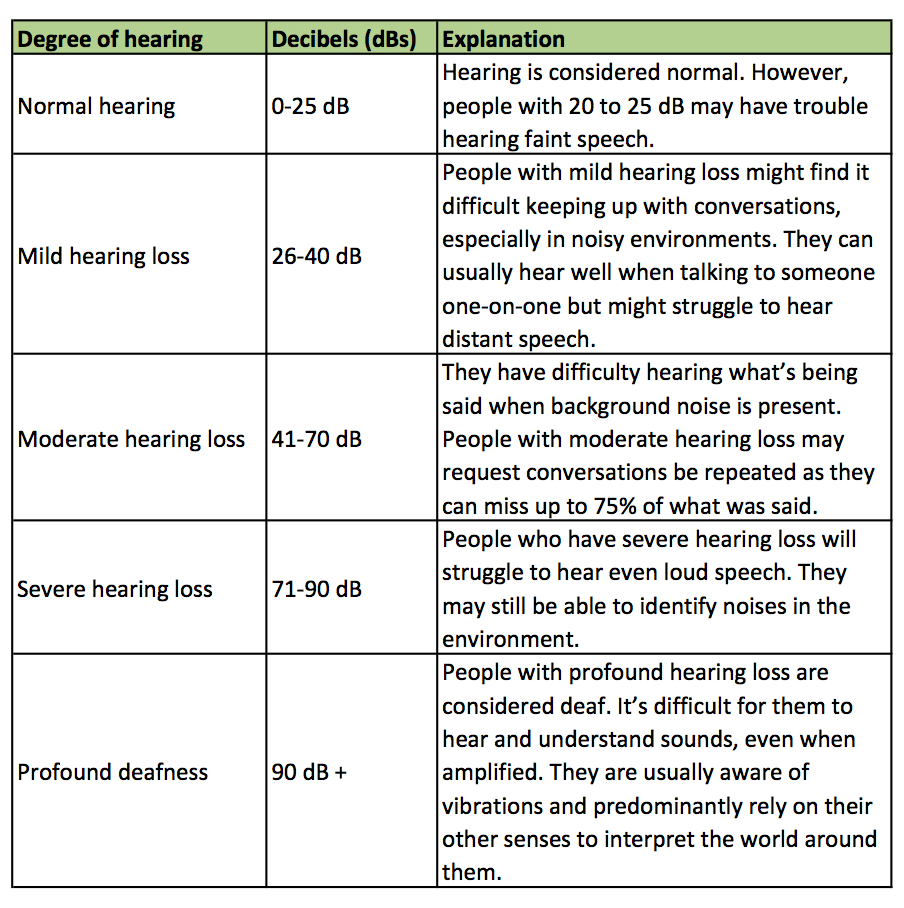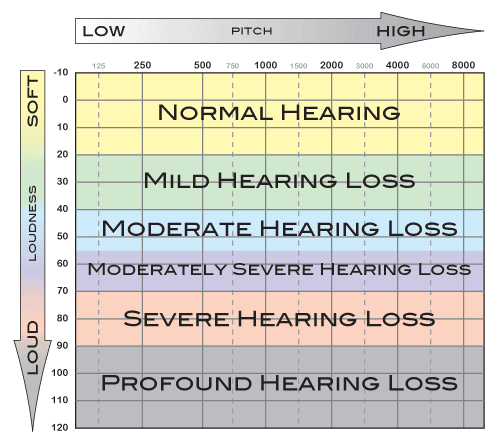The limitations and benefits of hearing aids – The real story
Hearing aids cannot magically restore a person’s ability to hear; rather they aid you in hearing better.
Hearing aids have been shown to improve a users’ quality of life, specifically improving communication in relationships, as well as providing the user with a sense of control.
However, as with most things in life, there are benefits and limitations to wearing hearing aids.
How do hearing aids work?
Hearing aids are small, battery powered devices with tiny microphones and speakers that amplify sound signals. Unlike glasses, you won’t have 100% hearing when you put them on. Depending on where your hearing loss is, a hearing aid can be programmed to adjust to the frequencies based on your hearing loss.
A trained and licensed hearing professional should first assess your level of hearing loss by performing a hearing test. They will then analyse the results and work with you to find a hearing device that suits your specific needs.
What are the different degrees of hearing loss?
There are five broad categories/degrees of hearing loss. Hearing loss is not measured in percentages, but in decibels (dB), which are logarithmic units. Decibels represent the lowest frequency of sounds that a person can hear.
People speak at 60 dB. Listening to noise at 85 dB for an extended length of time can cause permanent hearing loss.
The benefits of hearing aids
Today’s hearing aids have the ability to improve your quality of life, work effectiveness and long-term satisfaction. Almost invisible to the untrained eye, hearing aids are far less noticeable.
- Wearing hearing aids can improve your everyday life because they are designed to help you feel confident when participating in conversations.
- You’re able to enjoy listening to music and hear the butt-kicking sounds of the latest action movie.
- Hearing aids can balance out the frequency levels in both your ears, helping you locate where sounds are coming from. This is very useful for avoiding accidents.
- Today’s hearing aids don’t only amplify sounds; they also clarify sounds.
- Some hearing aids have been shown to reduce the symptoms of tinnitus, providing relief from that annoying ringing in your ears.
- Hearing aids are so small and compact nowadays, they hardly weigh a thing, making them much more comfortable.
The limitations of hearing aids
Hearing aids magnify sound vibrations entering your ear, which then get converted into neural signals that are passed along to your brain. It’s important to understand that hearing aids do not replace brain functioning. Thus there are limitations to the amount of amplification a hearing aid can provide.
Additionally, if your inner ear is too damaged, the amplified vibrations won’t convert into neural signals, making a hearing aid obsolete.
- Many people find hearing aids to be uncomfortable to wear at the beginning, they complain of ears becoming sweaty and itchy.
- Other users have mentioned wearing hearing aids to be very tiring, as their brains have to work harder to filter and process sounds.
- Some hearing aids have acoustic feedback and amplify background noises. Be sure to check that the volume is adjusted properly.
- There is an unreal expectation that because you’re wearing hearing aids, you should hear perfectly.
The limitations and benefits of hearing aids in different styles
In the past, people might have avoided their hearing aids because they are ugly and make the wearer seem old. Today, hearing aids come in a variety of styles, colours and prices.
Many people are making hearing aids fit their individual style. No longer is boring beige the norm, although it is still a very popular choice. Water resistant and waterproof hearing aids are also available for those living a more active lifestyle.
There are predominantly 4 different types of hearing aids, each with its own advantages and disadvantages.
- Behind-the-ear (BTE) hearing aids are worn behind your ear. This open-fit type of hearing aid is usually a good choice for people who experience a build-up of earwax. There are fewer feedback problems with the BTE and they rarely need repair. However, the style can be off-putting as it will be evident that you’re wearing a hearing aid and the ear moulds will need to be remade every few years to preserve the acoustic seal.
- In-the-ear (ITE) hearing aid fits completely inside your outer ear and is best for people who have slight to moderate hearing loss. An ITE is not recommended for children as their ears are still developing and growing.
- In-the-canal (ITC) hearing aids fit into your ear canal and are used by people who have mild to moderately severe hearing loss. Because of the close distance between the receiver and the microphone, there might be feedback problems. Also, the ITC is more susceptible to earwax and moisture damage.
- Completely-in-the-canal (CIC) hearing aids are more costly than the BTE or ITE hearing aids, but they are much less visible and would be a good style for someone a bit more self-conscious about wearing their hearing aids. The CIC’s overall sound quality is very good, due to its position in the ear. However, because of its placement, it is more prone to needing repairs, and many people experience the sound as being similar to talking into a bucket.
Where to buy hearing aids in the UK
Hearing aids are free of charge on the NHS, or you can choose to buy them privately.
You can purchase hearing aids from Boots, Specsavers, or from private hearing aid dispensers.
Once lost, hearing can never be restored. It can only be improved using various methods and devices.
The benefits of hearing aids have improved tremendously in the last couple of years, but they’re not perfect, and not everyone will benefit from wearing them. First, go to a hearing specialist and get tested and listen to what he recommends for you.
Hearing Aid Know is an excellent impartial resource for finding out more about getting a hearing test, and buying a hearing aid, and accessing high quality hearing care.
Click here for more on the advantages and disadvantages of hearing aids or leave a comment and tell us about your hearing aid experience.
Trackbacks & Pingbacks
-
[…] READ MORE […]
-
[…] easy – for example, I can’t just pick up the phone like a hearing person can, hearing aids have their limitations, and even cochlear implants aren’t the magic cure for deafness that people think they […]
Leave a Reply
Want to join the discussion?Feel free to contribute!







Thank you for this useful article.
I would add among the benefits the privilege that hearing aid users have in connecting to induction hearing loops, when available in some buildings.
I think its really cool that a new hearing aid can not only help to amplify sound, but it will also be able to clarify. My mom has started to struggle with her hearing so I’ve been wanting to talk to her about getting a hearing aid. I think that checking out a few hearing aid brands and seeing what she thinks is comfortable and looks acceptable is the best way to help her help herself when it comes to hearing.
Hearing Aids Perth WA service is very popular and also it is in demand. Out of 10 people 1 people is suffering from hearing problem. But your aids make them to be live a comfort life. Publish some more post on it. This gave us a huge knowledge about hearing aids equipment.
I have mild hearing loss 30 dB to 95 dB, I am unable to hear discussions when in group inside rooms or outside. I can hear one to one at normal conversation more 3 to 5 ft range conveniently inside rooms. What is the best type of hearing aid for me
My dad has been facing a lot of hearing issues and it has caused limitations in his conversations with family so I am glad that I found this article. I did not know that hearing aids are small and compact and are very light. I will definitely tell my dad this because he was worried that hearing aids would be extremely heavy and hurt his ears. Also, you make a great point that hearing aids will improve your confidence when participating in conversations.
My family has noticed that my grandpa has difficulty hearing during family conversations we have noticed that his hearing has gotten worse over the years. You make a great point that wearing hearing aids can improve your everyday life because they will help you to have confidence in social situations and conversations, which would be a huge benefit for my dad. Also, I will make sure to tell my dad that hearing aids are small and compact so they will not be difficult to use and take with him to different events.
I really liked what you said about how today’s hearing aids not only amplify sound but clarify it so you can understand as well as hear around you. My uncle is losing his hearing and isn’t sure about hearing aids being able to help him but misses hearing people around him. Thank you for the information about how the hearing aids can also balance our the frequency levels in both your ears so you can locate where sounds are coming from.
Having recently had my third set of hearing aids over the last 20 years, I feel that I am sometimes feel a little dizzy with my new set,is this comment??
It’s good to learn that modern hearing aids clarify sound. My wife was wondering how hearing aids could help with her ears. I’ll be sure to let her know that hearing aids help clarify sound.